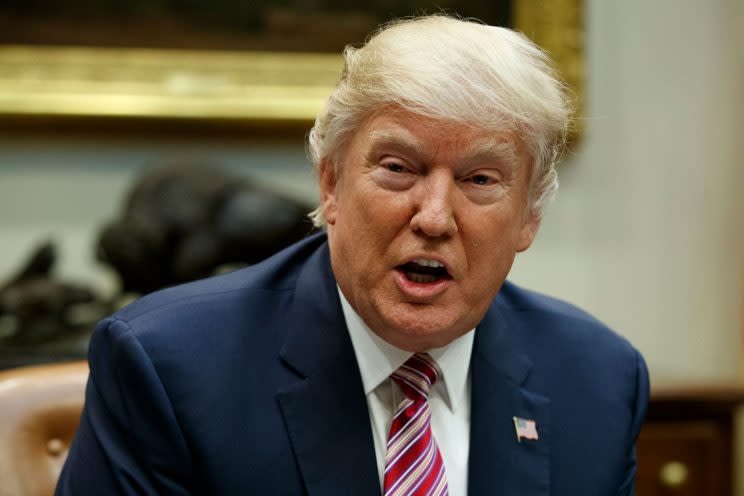The blame game: Should Democrats worry about Trump letting Obamacare fail?

WASHINGTON — President Trump reportedly has a backup plan if congressional Republicans are unable to pass repeal-and-replace legislation for Obamacare: blame Democrats.
In a closed-door meeting earlier this week with conservative lawmakers and groups who have raised objections to the controversial replace plan, Trump said that Democrats would take the blame if the GOP cannot reach an agreement on it and the bill fails, according to CNN.
Trump has made a similar claim several times in the past.
“From a purely political standpoint, the single best thing we can do is nothing,” he told supporters at CPAC last month. “Let it implode completely — it’s already imploding. You see the carriers are all leaving. I mean, it’s a disaster.”
Trump said Democrats would “beg” for help when that happened, and it would be “their problem.” But the president added, “It’s not the right thing to do,” and Republicans should fix the system.
massive increases of ObamaCare will take place this year and Dems are to blame for the mess. It will fall of its own weight – be careful!
— Donald J. Trump (@realDonaldTrump) January 4, 2017
Should Democrats be concerned that the health care exchanges, which cover 12 million Americans, will “implode” and they’ll take the political blame?
Democratic Minority Leader Nancy Pelosi was defiant when asked about this on Thursday, saying she believed that Trump would be fully responsible. “I don’t think the president really knows what he’s talking about,” she said, adding that many of the people who benefited from the Affordable Care Act live in red states that voted for Trump and may turn on him if they see their care get worse.
The Affordable Care Act expanded coverage to about 20 million more Americans by setting up state exchanges, where people could buy insurance with subsidies based on their income, and by giving states federal money to expand Medicaid to more of their populations. State exchanges have not attracted as many people as Democrats originally predicted, and some plans come with high deductibles that stick people with a big bill for care. Democrats argue that these problems could be fixed with a few tweaks, while Republicans have put forward their plan to gut and replace the subsidy system with an age-based tax credit.
The individual market could see significant damage over the next year or two — though much of it through the Trump administration’s own actions.
The biggest risk to the exchanges is that insurers will decide not to participate next year because of rising premium costs, according to Washington and Lee University School of Law professor Timothy Jost, a health care expert. Most of the people who buy insurance on the exchanges — about 85 percent — will not be affected by premium hikes because their out-of-pocket premium expenses are limited by their annual income.
However, if insurers decide to leave the market, many people could find that their state doesn’t have an exchange anymore.
“The individual insurance market is a small part of the business and has recently not been a very profitable part of the business for health insurers,” Jost said.
The Trump administration could take several steps that would push insurers out the door. The White House already scrapped television and radio ads during the last week of enrollment in January, which Jost believes led to a drop of younger enrollees who keep costs down. Trump also signed an executive order that suggests he may not enforce the individual mandate in the future, which would also likely cause younger and healthier people to leave the market. In the future, the administration could slow or block some government payments to the insurance companies for 2016 that have not yet come through, sending a message to the insurers to leave.
Insurance company Humana already announced that it would leave the market before 2018, citing instability.
If the health care exchanges collapse next year, Jost believes it will be through the Trump administration’s desire for them to do so, since there was evidence that costs were stabilizing last year.
Insurers must decide by June 21 whether to participate in the individual markets next year. Americans in the exchanges will then begin to learn whether their coverage will be cut off in the future.
But it remains to be seen whether Americans would blame the law’s namesake — former President Barack Obama — and the Democratic Party for that failure.
“If the Trump administration continues sabotaging the law, then they’ll be responsible for the damage that causes to families,” said Jesse Ferguson, a former Hillary Clinton campaign official now advising Democrats on health care. “He can’t make us responsible for his bad decisions. If they break it, they own it.”
Liz Mair, a Republican strategist who opposed Trump, said she believes that Democrats will have a “compelling case” that Republicans were in charge of the White House and Congress and didn’t deliver on their promise to fix the health care system. And that argument would come right in time for the 2018 midterm elections.
“If this becomes a bigger mess than it is now, Republicans in general better be ready to run really top-notch campaigns, because this isn’t going to be as easy a cycle, I don’t think, as they may have predicted,” Mair said.
Trump, however, is a different story. Mair believes the first-time politician could easily turn around and blame Republicans — not Democrats — for the mess and attempt to stay above the fray.
“He’d be perfectly happy to trash congressional Republicans for not sending a bill to his desk and then showing how bipartisan and ‘for the people’ he is by working with Democrats,” she predicted.
Read more from Yahoo News:



